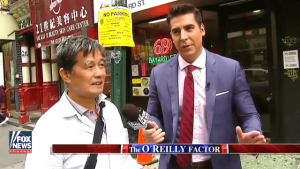By Gillian Reinhard ’20
Staff Writer
On Oct. 5, the Trinity College Department of Political Science hosted a discussion event with Chris Murphy, the Junior United States Senator from Connecticut. With foreign policy as the topic of conversation, Murphy provided insight and analysis as the 2016 Presidential Election draws near.
The senator was invited by Jack Ostrowski ’17, who previously worked as an intern in Murphy’s office. The event was coordinated with assistance from Professor Thomas Lefebvre of the Political Science department. The forum, attended by about 200 students and faculty members, was Murphy’s first official visit to Trinity. “Senator Murphy and his staff had a great time coming to the campus. He really enjoyed engaging with our students,” commented Ostrowski.
Murphy introduced himself as someone with a close relationship to Trinity. He cited his upbringing in nearby Wethersfield as well as his relationship to the NESCAC schools; his brother a Trinity graduate and himself an alumnus of Williams College. Immediately, he expressed his gratitude for the large crowd who had gathered to see him, remarking that “there are not enough college students thinking about the world.”
Murphy launched into a brief overview of his work on the U.S. Senate Committee on Foreign Relations committee and as U.S. Senator. His interest in this career field began by opposing the War in Iraq and Afghanistan, while still maintaining the belief that the United States should be an international leader and is weaker when shut off from the world. Murphy discussed the overall trend of increasingly reduced budget changes in American foreign policy initiatives and outlined his thoughts on Russia, which he described as “asymmetric warfare as shown through gas, oil and information.”
The senator also discussed the implications of the War on Terror and criticized the country’s faltering relations with Islam and the Middle East. Murphy spoke on the harmful narrative of the “Modern Crusade” of the East vs. West, which only exacerbates animosity in groups such as the Islamic State. He introduced the conflict as both a military and moral fight, citing the concerning fact that over 95 percent of those killed in foreign drone attacks are innocent civilians. With this overview relayed to the audience, Murphy took questions from members of the community, ranging from questions on Ukraine, cyber security, and immigration.
Upon being asked to elaborate on presence of Islamophobia in the United States, Murphy emphasized the importance of countering the Islamic narrative by inclusiveness and tolerance, while also accepting that the battle of moderate and conservative Islam is real.
Murphy continued to receive questions on the Middle East. He strengthened his position that Israel is an extremely important, if not paramount, ally to the United States, but foreign aid to the country must be evaluated, as Israel is not above criticism. Senator Murphy was also asked to elaborate on the recently released bill allowing families of 9/11 victims the right to sue Saudi Arabia. Prompted by the question, he delved into the politics of Saudi Arabia as a nation, stating that there is no evidence the Saudi government directly supported 9/11, but the question of the country as an ally is “not consequential, and requires a broader rethink.”
Outside of the Middle East, Murphy faced questions concerning other international issues. He examined the complex situation in Ukraine and introduced Putin as a leader bent on ruining Ukraine politically and economically. Murphy was adamant about preventing Ukraine from falling under the Russian sphere of influence.
Additionally, the senator faced queries on the India and Pakistan conflict. Murphy criticized the United States’ excessive spending on relations with the two countries that also maintain nuclear capabilities. He spoke of increased progress between India and United States, with a strong alliance established and of the more complicated connection between Pakistan and the United States.
Finally, Murphy highlighted the complicated relationship between China and the United States, commenting that it is “an economic interdependence that cannot be unwound.” Despite this, he stated that China is not an enemy, but tougher standards must be imposed for a successful relationship.
Murphy also responded to questions on a multitude of other issues. He established a welcoming stance towards immigration, remarking that immigrants greatly enhance both the cultural and economic strength of the United States and should be provided with a pathway to citizenship. Upon being prompted to state his position on climate change, Murphy asserted that humans are the cause of global warming and denounced politicians who denied this for financial gain. The senator also commented on the complicated and controversial world of cyber security, telling the audience that the United States is undeniably under technological attack.
The conversation was extremely successful among the Trinity community, with many saying that the event was straightforward, informative and inspiring. Towards the end, Murphy stressed importance of international relations and told the crowd it is one of the most rewarding careers available, in his opinion. He encouraged Trinity students, as residents of the Connecticut state capital, to fully embrace American politics. “People who say the young cannot make a difference are dead wrong,” said Murphy, “Do not leave leadership to someone else.”
Chris Murphy Discusses Foreign Policy with Students



+ There are no comments
Add yours